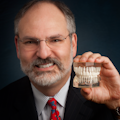The end of the year is almost here, and we need to prepare for another year of growing and improving. How do you do that? Remember that to eat an elephant, you must do it one bite at a time. Building a dental practice of your dreams takes time, but you can destroy it quickly by making foolish personal decisions that directly affect your office. If you find yourself in self-destructive behavior, get some help.
Note the headline this month is “Do you have DDS or DMD?” In this case, DDS stands for dental disinformation disease and DMD stands for dental misinformation disease. I wish I could say that this is my idea, but it comes from another dentist, Dr. Robert Lee. I learned his meaning for the acronyms from his son, Thomas E. Lee, president of Panadent, a dental product manufacturer and distributor. He said dental students often learn DDS or DMD from their professors. He believes they do not recover unless they take courses to expand their information and critical thinking.
I graduated in 1978 from Tufts School of Dental Medicine, and I will admit that nearly everything I do in my office today, I did not learn in dental school. How can I possibly say that? In dental school, I did not learn how to remove teeth, do injections, prep for crowns, do veneers, or cement restorations. Certainly, practice management, staff management, and financial practice management were never taught. The basics of dentistry and the materials and methods of that time were taught, but our profession has moved forward quickly. But DDS and DMD were all around, and still are.
DMD and DDS
How did DMD and DDS affect me? I, and many of my peers, have heard many incorrect things through the years. “All TMD patients are crazy.” “Dentures should only be made with flat plane occlusion.” “Acid on teeth will kill the pulp and only the endodontist will be happy.” “Always place a liner or base under all restorations.” “Composite restorations will not last.” I'm sure you could share many examples as well, and hopefully you've learned new and better ways.
Even your patients may have DDS and DMD because they’ve heard many myths through the years. For example, growing up, my dentist told me that sugar caused my cavities. Well, we know sugar contributes to cavities, but it’s the bacteria that eats the sugar.
A friend actually told me that me that bleeding gums are OK and we don’t need to floss, we just need to chew gum and our mouth will be clean! Our patients need correct information explained in a way that won't made them feel "bad" about themselves.
The DDS and DMD thing happens all the time with difficult dental concepts such as implant dentistry, occlusion, restorative and prosthetic dentistry. I truly believe that we must make decisions based on reliable information. But remember, I said there is nothing I do today that I learned in dental school. Will this be true for today’s dental students? I feel like it will be true because I’ve met students who have done one denture, removed about 30 teeth, and done very little restorative dentistry. They must take many hands-on courses to learn mainstream dentistry.
Remember, to be successful you must achieve balance and artful dentistry, based on great science, in a businesslike manner. Here’s hoping for a successful 2023!
Editor's note: This article appeared in the December 2022 print edition of Dental Economics magazine. Dentists in North America are eligible for a complimentary print subscription. Sign up here.
About the Author
Jeffrey C. Hoos, DMD
Jeffrey C. Hoos, DMD, a 1978 graduate of the Tufts University School of Dental Medicine, started his private practice as a one-operatory walk-up and grew it to a four-doctor practice with 25 staff members. He lectures on innovative techniques that balance the art, science, and business of dentistry. He is one of the first general dentists to be Brånemark certified for implant placement, and his office has become a teaching center for restorative and implant dentistry. Contact him at [email protected].

